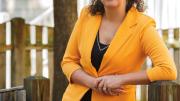“One of the big questions of science is trying to understand how our universe works,” says assistant professor of physics Roxanne Guenette. “Why is 25 percent of matter currently unknown? We know it’s there, but don’t know what it is.” That she pursues such questions might seem improbable: no one else in her family has a college degree, nor does anyone she grew up with. At 13, she began looking at the constellations in the night sky above Mont-Saint-Michel, a French-speaking village of 600 north of Mont Tremblant in Québec. At 17, she began racing stock cars. “My mum hated that. She was scared.” That year Guenette also looked through a telescope for the first time—and dreamed of becoming an astrophysicist. Without college, she knew, she’d probably end up working in a mill. (Timber’s the big local business). After studying physics at the University of Montréal, then astrophysics at McGill, she switched her focus to neutrinos during a Yale postdoc. At the origin of the universe, she explains, “The Big Bang produced matter and antimatter that should have recombined. We should not be here—but somehow matter started to dominate.” Seeking to learn what happened, she builds and tests detectors for studying neutrinos and antineutrinos, particles so small that billions pass through us, harmlessly, every second. They can’t be seen, but in supercooled liquid-argon-gas detectors, they leave tracks, producing electrons that permit scientists to reconstruct their paths. If antineutrinos behave differently than neutrinos do, that might lead to new understandings of fundamental physics. Although her husband, trained as a cosmologist, grasps all this, her two young sons are more interested in cars than stars. As for Guenette, she doesn’t race anymore—except “sometimes when I go back home, for fun,” on a track her father built. “Just me and my brothers.”
Harvard Portrait: Roxanne Guenette
Harvard Portrait: Roxanne Guenette
Seeking answers to science’s biggest questions

Roxanne Guenette
Photograph by Stu Rosner
You might also like
How a Harvard Hockey Legend Became a Needlepoint Artist
Joe Bertagna’s retirement project recreates figures from Boston sports history.
Introductions: Mallika Monteiro
A conversation with a beer industry executive
Mount Vernon, Historic Preservation, and American Politics
Anne Neal Petri promotes George Washington and historic literacy.
Most popular
Explore More From Current Issue

The Enterprise Research Campus in Allston Nears Completion
A hotel, restaurants, and other retail establishments are open or on the way.






